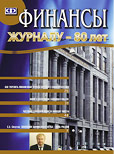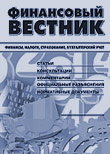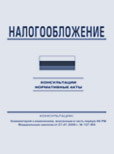Содержание
АКТУАЛЬНО
Р.Е. Артюхин, руководитель Казначейства России, кандидат юридических наук
E-mail: finance-journal@mail.ru
Четверть века назад был создан и вступил в силу Бюджетный кодекс Российской Федерации (БК РФ), и с этого момента бюджетные отношения получили системность и полноту правового регулирования.
В статье отражено, как проходило структурное развитие БК РФ, как за время своего существования он обогатился новыми терминами и понятиями, какое место занимает БК РФ среди федеральных законов и почему он предопределяет в значительной степени содержание финансово-правовых норм в иных федеральных законах.
Прочитав данную статью, вы сможете узнать о четырех устойчивых группах законов, которые можно отнести к категории бюджетных законов, имеющих свой предмет правового регулирования, а также о том, какие имеются две тенденции правового регулирования в развитии бюджетного законодательства и есть ли необходимость в новой редакции БК РФ.
Ключевые слова: Бюджетный кодекс РФ, федеральные законы, гражданское законодательство, финансово-бюджетная политика, правовое регулирование, развитие Бюджетного кодекса РФ, новая редакция Бюджетного кодекса РФ.
НАЛОГИ: ТЕОРИЯ И ПРАКТИКА
В.Г. Пансков, профессор-исследователь Финансового университета при Правительстве Российской Федерации, государственный советник налоговой службы I ранга, заслуженный экономист Российской Федерации, доктор экономических наук, профессор
E-mail: 5868116@mail.ru
В статье рассматриваются проблемы повышения роли налога на землю в формировании финансовой базы муниципальных образований. Проанализированы причины незначительного влияния налога на обеспечение доходов местных бюджетов. Показано, что одним из факторов, влияющих на незначительную эффективность действующих условий налогообложения земли, является отсутствие увязки размеров земельного налога с образованием земельной ренты. Внесены соответствующие рекомендации по совершенствованию налогообложения земельных угодий.
Ключевые слова: земельная рента, землепользователь, земельный участок, кадастровая стоимость, местный бюджет, местные налоги, налог на землю, налоговая ставка, налоговые льготы.
М.О. Измайлова, доцент кафедры бухгалтерского учета и налогообложения Байкальского государственного университета, кандидат экономических наук
E-mail: maryam_ka@mail.ru
Неформальная занятость физических лиц не только не способствует пополнению государственной казны любого государства, но и увеличивает ее масштабы за счет вовлечения в нее новых субъектов. Целью проведенного автором исследования было изучение влияния налогообложения доходов физических лиц на неформальную занятость. На основе анализа статистических данных Международной организации труда и Организации экономического сотрудничества и развития сделан вывод, что уровень неформальной занятости в меньшей степени обусловлен маргинальной налоговой ставкой индивидуального подоходного налога. Наибольшее влияние на увеличение масштабов неформальной занятости оказывает экономическая политика государства, в частности, непроработанная система налоговых льгот и отсутствие денежной поддержки наименее защищенных слоев населения, которые вынуждены экономить свои денежные средства для обеспечения минимального уровня жизни.
Ключевые слова: неформальная занятость, подоходный налог, налогообложение доходов, прогрессивная шкала налогообложения, плоская шкала налогообложения, налоговые льготы.
ФИНАНСЫ И БЮДЖЕТ: ПРОБЛЕМЫ И РЕШЕНИЯ
С.Е. Демидова, доцент Департамента общественных финансов Финансового факультета Финансового университета при Правительстве Российской Федерации, кандидат экономических наук, доцент
E-mail: sedemidova@fa.ru
Цель исследования – проанализировать систему управления налоговыми расходами исходя из реализации программно-целевых принципов формирования расходов бюджета. На основе анализа отечественного и зарубежного опыта представлены модельные элементы и процессы системы управления налоговыми расходами через их встраивание в бюджетный процесс. Становление системы управления налоговыми расходами можно считать завершенным, следующий этап развития – качественный – сталкивается с ограничениями. Методологической проблемой является отсутствие единства в методиках оценки и планирования налоговых расходов, неурегулированность отдельных процессов на региональном уровне. Технологические ограничения обусловлены отсутствием единого информационного ресурса, развитие которого должно обеспечить переход к мониторингу налоговых расходов и повышению качества прогнозирования бюджетных показателей. Для учета и сопоставимости налоговых расходов необходимо ведение идентификатора налогового расхода. Проблемы применения программно-целевых принципов в механизме налоговых расходов характеризуются возрастанием доли налоговых расходов, не включенных в государственные программы, нарушением сроков методического обеспечения процессов, невыполнением отдельных положений о налоговых расходах кураторами налоговых расходов.
Ключевые слова: налоговые расходы, налоговые льготы, управление налоговыми расходами, упущенные доходы бюджета, государственные программы.
КАЗНАЧЕЙСТВО: СТАНОВЛЕНИЕ И РАЗВИТИЕ
А.А. Лубоятников, руководитель Управления Федерального казначейства по Ленинградской области
E-mail: finance-journal@mail.ru
Статья посвящена отражение роли информационных технологий в деятельности Федерального казначейства. Активно внедряя информационные технологии, Казначейство России не только повышает эффективность своей деятельности, но также стремится к созданию инновационного и технологически продвинутого государственного аппарата. Внедрение новых технологий, например работа с большими данными, цифровизация процессов и клиентоцентричность, позволяет Федеральному казначейству поддерживать современные тренды и повышать эффективность управления финансами. В 2024 г. планируется внедрение стандартов клиентоцентричности во всех федеральных и региональных органах исполнительной власти. Еще одной важной задачей является централизация бухгалтерского учета, и на ближайшие 3–5 лет запланирована концепция перехода на обмен финансовой отчетностью с использованием модуля XBRL.
Ключевые слова: Казначейство России, информационные технологии, цифровизация государственных и муниципальных услуг, электронный сертификат, клиентоцентричность.
М.В. Кононова, начальник отдела расходов Управления Федерального казначейства по Омской области
E-mail: finance-journal@mail.ru
В статье представлена актуальная тема – тема казначейского обслуживания исполнения бюджета Фонда пенсионного и социального страхования Российской Федерации (Социальный фонд России).
Автором освещено одно из значимых направлений казначейского обслуживания – социальная сфера, задачей которой является реализация гарантированных государством социальных расходов для защиты (поддержки) граждан и повышения уровня жизни населения, а также роль Социального фонда России и Федерального казначейства в решении этой задачи.
Приведены статистические данные и визуализация результатов казначейского обслуживания исполнения бюджета Социального фонда России на основе практики Управления Федерального казначейства по Омской области. Отмечены преимущества получения социальной поддержки для держателей карты «Мир», а также представлена информация о возможностях электронного сертификата, как нового инструмента в области социального обеспечения.
Ключевые слова: Социальный фонд России, казначейское обслуживание, социальная сфера, электронный сертификат, УФК по Омской области.
ФИНАНСОВЫЕ РЫНКИ
Л.Г. Паштова, профессор Департамента «Корпоративные финансы и корпоративное управление» Финансового университета при Правительстве Российской Федерации, доктор экономических наук, профессор
E-mail: lgpashtova@fa.ru
Статья посвящена рассмотрению цифровых активов и правовому регулированию цифровых финансовых активов в России, особенностям регулирования цифровых финансовых активов, цифровых валют. Рассмотрены вопросы организации обращения в РФ цифровой валюты и интеграция механизма оборота цифровых валют и цифровых финансовых активов в финансовую систему России.
Ключевые слова: цифровые активы, цифровые финансовые активы, криптовалюта.
Ю.С. Евлахова, заведующая кафедрой финансового мониторинга и финансовых рынков Ростовского государственного экономического университета (РИНХ), доктор экономических наук, доцент
E-mail: evlahova@yandex.ru
Б.И. Туаршева, старший специалист службы финансового мониторинга Управляющей компании «Эмрис», магистрант Ростовского государственного экономического университета (РИНХ)
E-mail: finmonitor.rsue@gmail.com
В статье рассмотрена оценка рисков в рамках системы внутреннего контроля в целях противодействия отмыванию денег и финансированию терроризма в управляющих компаниях паевых инвестиционных фондов. Предложено установить пороговые суммы либо сократить количество видов операций, подлежащих обязательному контролю, по которым отчитываются такие управляющие компании. Эти меры позволят привести в соответствие уровень контроля в отношении управляющих компаний паевых инвестиционных фондов с низкой оценкой степени риска их вовлеченности в отмывание денег.
Ключевые слова: некредитные финансовые организации, риск-ориентированный подход, оценка рисков, идентификация, обязательный контроль.
ФИНАНСЫ СОЦИАЛЬНОЙ СФЕРЫ
Д.А. Артеменко, профессор Департамента менеджмента Факультета «Высшая школа управления» Финансового университета при Правительстве Российской Федерации, доктор экономических наук
E-mail: dartemen@mail.ru
Ф.Н. Кадыров, советник директора Центрального научно-исследовательского института организации и информатизации здравоохранения Минздрава России, заслуженный экономист Российской Федерации, доктор экономических наук
E-mail: kadyrov@mednet.ru
А.М. Чилилов, научный сотрудник Национального медицинского исследовательского центра хирургии имени А.В. Вишневского Минздрава России, кандидат экономических наук
E-mail: chililov@mail.ru
В представленной работе приводятся результаты исследования, посвященного анализу финансового обеспечения системы обязательного медицинского страхования в настоящее время и на ближайшей период. Показана динамика доходов и расходов бюджета Федерального фонда обязательного медицинского страхования, оценка имеющихся тенденций и некоторые перспективы развития системы обязательного медицинского страхования.
Проведен анализ соотношения темпов роста субвенций территориальным фондам обязательного медицинского страхования и темпов инфляции.
Обосновано утверждение о том, что основной причиной хронической дефицитности бюджета Федерального фонда обязательного медицинского страхования является непропорциональность взносов на страхование работающего и неработающего населения.
Выявлены недостатки основного механизма доведения средств обязательного медицинского страхования до субъектов Российской Федерации с точки зрения обеспечения равных экономических условий, а также выполнения указов Президента Российской Федерации по обеспечению уровня заработных плат работников здравоохранения.
Ключевые слова: обязательное медицинское страхование, доходы, расходы, субвенции, инфляция, нормированный страховой запас.
Content
TOPICAL
R.E. Artyukhin, Head of the Treasury of Russia, сandidate of law
Financial University under the Government of the Russian Federation
E-mail: finance-journal@mail.ru
A quarter of a century ago, the Budget Code of the Russian Federation (BC RF) was created and entered into force, and from that moment on, budgetary relations received consistency and completeness of legal regulation.
The article reflects how the structural development of the BC of the Russian Federation took place, how during its existence it has enriched itself with new terms and concepts, what place the BC of the Russian Federation occupies among federal laws and why it determines to a large extent the content of financial and legal norms in other federal laws.
After reading this article, you can learn about four stable groups of laws that can be classified as budgetary laws that have their own subject of legal regulation, as well as what are two trends in legal regulation in the development of budget legislation and whether there is a need for a new version of the BC of the Russian Federation.
Keywords: Budget code of the Russian Federation, federal laws, civil legislation, financial and budget policy, legal regulation, development of Budget code of the Russian Federation, new version of Budget code of the Russian Federation.
TAXES: THEORY AND PRACTICE
V.G. Panskov, professor-researcher of the Financial University under the Government of the Russian Federation, state adviser to the tax service of the 1st rank, honored economist of the Russian Federation, doctor of economics, professor
E-mail: 5868116@mail.ru
The article examines the problems of increasing the role of land tax in the formation of the financial base of municipalities. The reasons for the insignificant impact of the tax on the provision of local budget revenues were analyzed. It has been shown that one of the factors affecting the insignificant effectiveness of the current conditions of land taxation is the lack of linking the amount of land tax with the formation of land rent. Relevant recommendations have been made to improve the taxation of land.
Keywords: land rent, land user, land plot, cadastral value, local budget, local taxes, land tax, tax rate, tax benefits.
M.O. Izmailova, associate professor, Department of accounting and taxation, Baikal State University, candidate of economic sciences
E-mail: maryam_ka@mail.ru
Informal employment of individuals not only does not contribute to replenishing the state treasury of any state, but also increases its scale due to the involvement of new entities in it. The purpose of this study is to study the impact of progressiveness of personal income taxation on informal employment. Based on an analysis of statistical data from the International Labor Organization and the Organization for Economic Cooperation and Development, it was concluded that the level of informal employment is to a lesser extent determined by the marginal tax rate of individual income tax. The greatest influence on the increase in the scale of informal employment is exerted by the economic policy of the state, in particular, the lack of a well-developed system of tax benefits and monetary support for the least protected segments of the population, who are forced to save their money to ensure a minimum standard of living.
Keywords: informal employment, income tax, income taxation, progressive taxation scale, flat taxation scale, tax benefits.
FINANCE AND BUDGET: PROBLEMS AND SOLUTIONS
S.E. Demidova, associate professor, Department of public finance, Faculty of Finance, Financial University under the Government of the Russian Federation, candidate of economic sciences, associate professor
E-mail: sedemidova@fa.ru
The purpose of the study is to analyze the tax expense management system based on the implementation of the program and target principles for the formation of budget expenditures. Based on the analysis of domestic and foreign experience, model elements and processes of the tax expense management system are presented through their integration into the budget process. The formation of the tax expense management system can be considered completed, the next stage of development - of high quality - faces restrictions. The methodological problem is the lack of unity in the methods of assessing and planning tax expenditures, the inconsistency of individual processes at the regional level. Technological limitations are due to the lack of a single information resource, the development of which should ensure the transition to monitoring tax expenditures and improving the quality of forecasting budget indicators. The tax expense ID must be maintained for tax expense accounting and comparability.The problems of application of program-targeted principles in the mechanism of tax expenses are characterized by an increase in the share of tax expenses not included in state programs, violation of the deadlines for methodological support of processes, failure to comply with certain provisions on tax expenses by tax expense managers.
Keywords: tax expenses, tax benefits, tax expense management, lost budget revenues, government programs.
TREASURY: FORMATION AND DEVELOPMENT
A.A. Luboyatnikov, head of the Department of the Federal Treasury for the Leningrad region
E-mail: finance-journal@mail.ru
The article is devoted to reflecting the role of information technology in the activities of the Federal Treasury. By actively introducing information technologies, the Russian Treasury not only increases the efficiency of its activities, but also seeks to create an innovative and technologically advanced state apparatus. The introduction of new technologies, for example, working with big data, digitalization of processes and customer concentration, allows the Federal Treasury to maintain modern trends and increase the efficiency of financial management.In 2024, it is planned to introduce customer-centric standards in all federal and regional executive bodies. Another important task is to centralize accounting, and the concept of switching to financial reporting exchange using the XBRL module is planned for the next 3-5 years.
Keywords: Treasury of Russia, information technologies, digitalization of state and municipal services, electronic certificate, customer centrism.
SM.V. Kononova, head of the Expenses Department of the Federal Treasury in the Omsk region
E-mail: finance-journal@mail.ru
The article presents an actual topic - the topic of treasury servicing of the budget execution of the Pension and Social Insurance Fund of the Russian Federation (Social Fund of Russia).
The author highlighted one of the significant areas of treasury services - the social sphere, the task of which is to implement social expenses guaranteed by the state to protect (support) citizens and improve the standard of living of the population, as well as the role of the Social Fund of Russia and the Federal Treasury in solving this problem.
Statistical data and visualization of the results of treasury services for the execution of the budget of the Social Fund of Russia are presented on the basis of the practice of the Office of the Federal Treasury in the Omsk Region. The advantages of obtaining social support for Mir card holders were noted, as well as information on the possibilities of an electronic certificate as a new tool in the field of social security.
Keywords: Social fund of Russia, treasury service, social sphere, electronic certificate, UFK in Omsk region.
FINANCIAL MARKETS
L.G. Pashtova, professor, Department of corporate finance and corporate governance, Financial University under the Government of the Russian Federation, doctor of economics, professor
E-mail: lgpashtova@fa.ru
The article is devoted to the consideration of digital assets and legal regulation of digital financial assets in Russia, the peculiarities of regulating digital financial assets, digital currencies. The issues of organizing the circulation of digital currency in the Russian Federation and the integration of the mechanism for the turnover of digital currencies and digital financial assets into the financial system of Russia were considered.
Keywords: digital assets, digital financial assets, cryptocurrency.
Yu.S. Evlakhova, head of the Department of financial monitoring and financial markets, Rostov state university of economics (RSUE), doctor of economics, associate professor
E-mail: evlahova@yandex.ru
B.I. Tuarsheva, senior specialist of the financial monitoring service of the Emris management company, master's student of Rostov state university of economics (RSUE)
E-mail: finmonitor.rsue@gmail.com
The article considers the assessment of risks within the framework of the internal control system in order to counteract the legalization (laundering) of proceeds from crime and the financing of terrorism in the management companies of mutual investment funds. It is proposed to establish threshold amounts or reduce the number of types of transactions subject to mandatory control, which are reported by management companies of mutual investment funds. Such measures will bring into line the level of control in relation to management companies of mutual funds with a low assessment of the degree of risk of their involvement in money laundering.
Keywords: non-bank financial institutions, risk-oriented approach, risk assessment, identification, mandatory control.
SOCIAL FINANCE
D.A. Artemenko, professor, Department of management, faculty of Higher school of management, Financial University under the Government of the Russian Federation, doctor of economics
E-mail: dartemen@mail.ru
F.N. Kadyrov, advisor to the director of the Central research institute for the organization and informatization of health care of the Ministry of health of Russia, honored economist of the Russian Federation, doctor of Economics
E-mail: kadyrov@mednet.ru
A.M. Chililov, researcher at the A.V. Vishnevsky national medical research center for surgery of the Ministry of health of Russia, candidate of economic sciences
E-mail: chililov@mail.ru
The presented work presents the results of a study on the analysis of the financial support of the compulsory health insurance system at present and for the near future. The dynamics of revenues and expenditures of the budget of the Federal Compulsory Health Insurance Fund, an assessment of existing trends and some prospects for the development of the compulsory health insurance system are shown.
The ratio of subvention growth rates to territorial compulsory health insurance funds and inflation rates was analyzed.
The statement is substantiated that the main reason for the chronic deficit in the budget of the Federal Compulsory Health Insurance Fund is the disproportionate contribution to insurance of the working and non-working population.
The shortcomings of the main mechanism for bringing compulsory health insurance funds to the constituent entities of the Russian Federation from the point of view of ensuring equal economic conditions, as well as the implementation of decrees of the President of the Russian Federation to ensure the level of wages of healthcare workers were identified.
Keywords: compulsory health insurance, income, expenses, subventions, inflation, normalized insurance stock.











